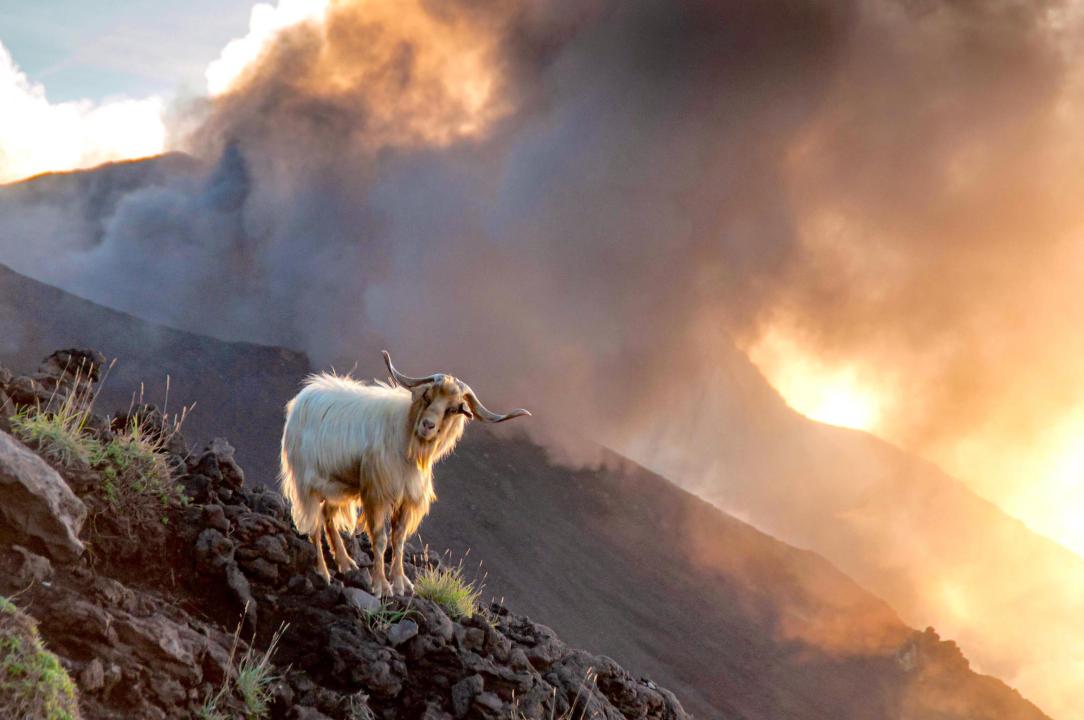Those in charge of Sicily have at last swung into action after a quarter of a century of inactivity to cleanse the tiny volcanic island of Stromboli in the Ionian Sea of its plague of goats.
There are well over 2,000 extremely agile, stubborn and aggressive, semi-wild goats on Stromboli (human population 500) whose active volcano is visible in the night sky from mainland Italy 30 miles away.
The Stromboli goats devour anything that is green and has roots and clamber into trees and onto the flat roofs of the houses to defecate and urinate. The islanders use their roofs to collect rainwater, their only source of fresh water. The goats even head butt their way inside houses and bars, and charge at people. It is a miracle that no one has been killed. In July, for instance, a herd of goats nearly drove two tourists off a cliff edge who were walking along a path to a beach.
But last week, after refusing to do anything for years, the powers that be somehow managed to do what could so easily have been done many moons ago: they employed a firm of specialists to install three small pens on the island in goat hot-spots such as the cemetery, with inside copious amounts of hay and water for bait.
Lo and behold, in no time at all, 132 goats were unable to resist the temptation and entered the pens, once they were made operational on Thursday. The goats were then herded onto a lorry and deported by ferry to a farm in Sicily where they will be health-checked and given away.
I asked Dottoressa Carolina Barnao, the bureaucrat in charge who is exceedingly charming, why it has taken 25 years to come up with this obvious solution.
‘That’s una bella domanda (a beautiful question),’ she replied with a laugh.
‘The goats have eaten everything else and were so hungry they entered the pen as quick as lightning!’ she added.
‘Buon lavoro,’ I said. ‘Anche a te,’ she replied.
It would, of course, have been easier to just kill the goats and eat the lot but the politicians and the bureaucrats had ruled out any form of final solution involving guns or gas because they felt unable to say ‘go take a hike’ to the animalists and planet savers who do so adore Stromboli and its hotline to the centre of the Earth, and insist that, like goats everywhere, its goats have rights too.
Naturally, those forced to live cheek by jowl 24/7 with the Stromboli goats beg to differ.
The epicentre of the havoc wreaked by the goats is the little port of Ginostra on the south side of the island which has only 40 full-time inhabitants.
A severe eruption in 2002 which caused a landslide and a tsunami 10 metres high led to the evacuation of the island’s human inhabitants and an even bigger eruption in 2019 sent an ash cloud 2,000 metres into the air.
But the goats, whose numbers have grown exponentially since a handful escaped from captivity at the turn of the millennium, pose a bigger threat than the volcano.
Each female goat breeds twice a year and produces on average three goatlets per pregnancy. There are now about 1,000 females. The situation, obviously, is out of control.
‘Three nights ago there was a big bright moon and they smashed the windows of a house and its front door because they saw their reflections in the windows,’ Giancarlo Giuffré, the owner of one of the two shops in Ginostra, tells me. ‘To defend ourselves we are forced to barricade ourselves in our houses and erect complex structures around our plants.’
‘They all attacked me,’ said Federico, ‘throwing me into the air.’
The goats are not exactly a very appealing advertisement either for this island whose main source of income is tourism.
Giuffrè adds: ‘We don’t want to be alarmist, as we live by tourism, but we are besieged by goats. The situation has become very challenging. At night we used to sleep with our doors open, now if you did that, you’d get goats in your bed. They must be taken away or killed: it’s either them or us.’
Fellow islander Federico Ascheri has told the Italian press: ‘I was in my garden when a large herd came rushing in, looking for something to eat. A very large goat eyeballed me and when I tried to scare him off, they all attacked me, throwing me into the air.’
Daniela Simoncini, from Bologna, who has owned a house on Stromboli for decades is a frequent victim. ‘They devastate the capers and the olive trees, they enter our house, we get them on our patios, and our terraces, and they even come here to die. Seven in the last 15 days,’ she said.
In order to strike up a rapport based on shared experience with signor Giuffré I tell him about my donkey which if it escapes from its fenced off paddock, which it often does because it is very clever, eats any plant that it encounters.
‘Yes, yes, I know, but goats are far worse, they even eat the bark on the trees,’ he says.
‘The olive trees are all dying as a result,’ he explains, ‘and there is not a vine left standing. My father who is 78 used to harvest 1,000 kilos of capers a year but this year he only managed 150 kilos. The goats have eaten the lot.’
The reason for the great goat crisis on Stromboli is not simply that its goats have been allowed to breed uncontrolled. The island which is just 12.6 square kilometres in size consists almost entirely of a volcanic mountain, and the goats used to live higher up its slopes.
But a devastating fire in 2022, allegedly caused by a negligent television crew working on a detective series who were filming on the island, destroyed up to half the island’s vegetation. In 2024, there was also severe flooding which compounded the problem.
So the goats came down from the mountain in search of food, and stayed.
Stromboli is the most eastern of the seven islands in the Aeolian archipelago and both its mayor Riccardo Gullo – who is supposedly apolitical and is based 30 miles away on the largest island of Lipari – and the right-wing regional government in Sicily have done their best to ignore the goat crisis.
To placate animal rights activists, eco-warriors and new age hippies, who for some reason believe the goats have the right to roam for ever on the island because it has become ‘their home’, the politicians have done their best to avoid the obvious solution: death to most, if not all, the goats. The Stromboli goats are not even a protected species like the Mouflon which in Italy is found on the Tuscan island of Giglio. They are a bastard mix of numerous types of farmyard goat and collectively known as ‘la capra domestica inselvatichita’ (the rewilded domestic goat).
‘There is no war on goats,’ Gullo used to bleat. I did try to get him on the phone, and on Whatsapp, but he was incommunicado. Of course he was. Giuffré calls the mayor ‘Putin’ because in his view he refuses to respect the will of il popolo.
‘We’re pleased the institutions have at last begun to do something, but will this just be a one off operation to silence the press or the start of something serious?’ wonders Signor Giuffré. ‘Let us be clear: taking away a 100 odd goats is just a drop in the ocean.’
It would seem that Signor Giuffré may well be right to doubt the sincerity of those in charge of the operation because this is what Dottore Giovanni Dell’Acqua, head of the provincial government department in charge of the technical side of the goat deportations, tells me: ‘We will suspend the operations of capture in mid-October but will begin them again next year. We will try to capture, now, about 300 to 350 goats per island.’
There is a similar goat crisis on the even smaller Aeolian island of Alicudi 60 miles west of Stromboli.
Why is it that the goats are breeding like rabbits and the island women are not?
So I replied to the Dottore: ‘Scusi Dottore, I am unable to understand why it has taken more than 20 years and a super qualified firm to construct three simple penswith hay and water inside. Anyone could do such a thing, even me, no? So how come these biblical delays in your case? And I ask you: why will only 300-350 goats be taken away from Stromboli – if I have understood you correctly – when there are more than 2,000 and each female has six kids a year? What is your motive for stopping at 300-350?’
Dottore Dell’Acqua declined to honour me with any further information.
Meanwhile, Peppe Paino, editor of the Giornale di Lipari, the main newspaper for the Aeolian Islands, is angry that the media is talking about goats and nothing else.
‘Egypt had seven plagues in the Bible, we have 40,’ he tells me. ‘We need a piano nazionale (national plan) to combat the depopulation of our islands.’
So why is it, I ask him, that the goats are breeding like rabbits and the island women are not? ‘Because our women have to go to Sicily 30 miles away to give birth.’
It was on Stromboli that Roberto Rossellini set his classic 1950 neo-realist film Stromboli, Land of God starring Ingrid Bergman. The film is about a Lithuanian refugee who secures release from an internment camp at the end of the Second World War by marrying an Italian POW who is a fisherman from Stromboli. But she cannot cope with the claustrophobic life on the tiny island or her chauvinistic husband and so, even though pregnant, she decides to escape. The only way is to climb over and around the volcano to the port on the other side where there is a ferry for the mainland. It is not clear at the end of the film if she succeeds, or dies in the attempt.
The moment has surely arrived for a new film: Stromboli, Land of Goats.









Comments